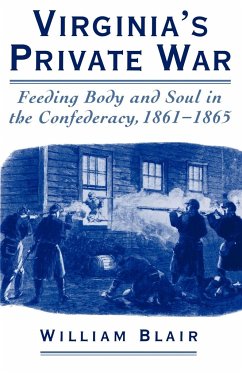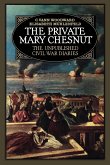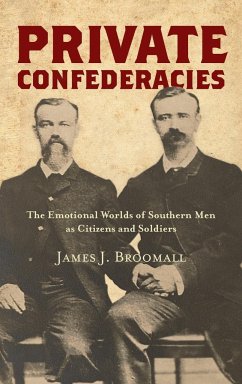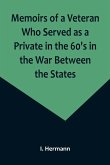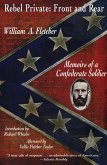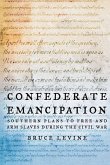Various groups vented their hatred on Virginias rich men of draft age who stayed out of the army by purchasing substitutes. Such complaints, ironically, may have prolonged the war, for some of the Confederacy's leaders responded by forcing the wealthy to shoulder more of the burden for prosecuting the war. Substitution ended, and the men who stayed home became government growers who distributed goods at reduced cost to the poor. But, as the case is made in Virginias Private War, none of these efforts could finally overcome an enemy whose unrelenting pressure strained the resources of Rebel Virginians to the breaking point. Arguing that the state of Virginia both waged and witnessed a "rich man's fight" that has until now been downplayed or misunderstood by many if not most of our Civil War scholars, William Blair provides in these pages a detailed portrait of this conflict that is bold, original, and convincing. He draws from the microcosm of Virginia several telling conclusions about the Confederacy's rise, demise, and identity, and his study will therefore appeal to anyone with a taste for Civil War history-and Virginia's unique place in that history, especially.
This book tells the story of how Confederate civilians in the Old Dominion struggled to feed not only their stomachs but also their souls. Although demonstrating the ways in which the war created many problems within southern communities, Virginia's Private War: Feeding Body and Soul in the Confederacy, 1861-1865 does not support scholars who claim that internal dissent caused the Confederacy's downfall. Instead, it offers a study of the Virginia home front that depicts how the Union army's continued pressure created destruction, hardship, and shortages that left the Confederate public spent and demoralized with the surrender of the army under Robert E. Lee. This book, however, does not portray the population as uniformly united in a Lost Cause. Virginians complained a great deal about the management of the war. Letters to the governor and to the Confederate secretary of war demonstrate how dissent escalated to dangerous proportions by the spring and summer of 1863. Women rioted in Richmond for food. Soldiers left the army without permission to check on their families and farms. Various groups vented their hatred on Virginias rich men of draft age who stayed out of the army by purchasing substitutes. Such complaints, ironically, may have prolonged the war, for some of the Confederacy's leaders responded by forcing the wealthy to shoulder more of the burden for prosecuting the war. Substitution ended, and the men who stayed home became government growers who distributed goods at reduced cost to the poor. But, as the case is made in Virginias Private War, none of these efforts could finally overcome an enemy whose unrelenting pressure strained the resources of RebelVirginians to the breaking point. Arguing that the state of Virginia both waged and witnessed a "rich man's fight" that has until now been downplayed or misunderstood by many if not most of our Civil War scholars, William Blair provides in these pages a detailed portrait
Hinweis: Dieser Artikel kann nur an eine deutsche Lieferadresse ausgeliefert werden.
This book tells the story of how Confederate civilians in the Old Dominion struggled to feed not only their stomachs but also their souls. Although demonstrating the ways in which the war created many problems within southern communities, Virginia's Private War: Feeding Body and Soul in the Confederacy, 1861-1865 does not support scholars who claim that internal dissent caused the Confederacy's downfall. Instead, it offers a study of the Virginia home front that depicts how the Union army's continued pressure created destruction, hardship, and shortages that left the Confederate public spent and demoralized with the surrender of the army under Robert E. Lee. This book, however, does not portray the population as uniformly united in a Lost Cause. Virginians complained a great deal about the management of the war. Letters to the governor and to the Confederate secretary of war demonstrate how dissent escalated to dangerous proportions by the spring and summer of 1863. Women rioted in Richmond for food. Soldiers left the army without permission to check on their families and farms. Various groups vented their hatred on Virginias rich men of draft age who stayed out of the army by purchasing substitutes. Such complaints, ironically, may have prolonged the war, for some of the Confederacy's leaders responded by forcing the wealthy to shoulder more of the burden for prosecuting the war. Substitution ended, and the men who stayed home became government growers who distributed goods at reduced cost to the poor. But, as the case is made in Virginias Private War, none of these efforts could finally overcome an enemy whose unrelenting pressure strained the resources of RebelVirginians to the breaking point. Arguing that the state of Virginia both waged and witnessed a "rich man's fight" that has until now been downplayed or misunderstood by many if not most of our Civil War scholars, William Blair provides in these pages a detailed portrait
Hinweis: Dieser Artikel kann nur an eine deutsche Lieferadresse ausgeliefert werden.

